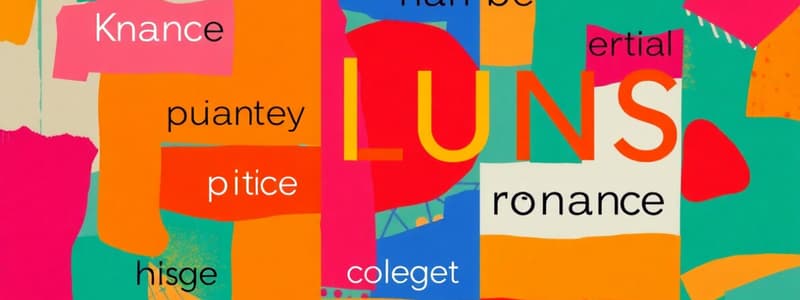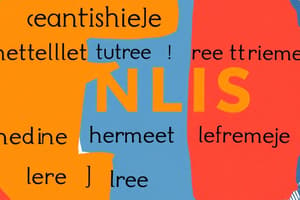Podcast
Questions and Answers
Which sentence demonstrates the correct usage of 'job' and 'work'?
Which sentence demonstrates the correct usage of 'job' and 'work'?
- He needs to find some job to do over the summer.
- She applied for a new job at the law firm. (correct)
- He secured a new work in the marketing department.
- She is pursuing a new work at the technology company.
In which scenario is 'work' used as a collective noun?
In which scenario is 'work' used as a collective noun?
- He completed all of his works before the deadline.
- She has a work interview tomorrow.
- The company offers various works for its employees.
- They have so much work to do before the presentation. (correct)
What differentiates 'story' from 'history'?
What differentiates 'story' from 'history'?
- 'Story' is exclusively factual, while 'history' is fictional.
- 'Story' is a narrative that can be factual or fictional, while 'history' is a factual record of past events. (correct)
- 'Story' always pertains to significant world events, while 'history' focuses on personal narratives.
- 'Story' and 'history' are interchangeable terms with no distinct differences.
Which of the following sentences correctly uses 'story' or 'history'?
Which of the following sentences correctly uses 'story' or 'history'?
Which sentence best reflects the use of 'work' as a verb?
Which sentence best reflects the use of 'work' as a verb?
How can 'job' and 'work' be used similarly by native speakers?
How can 'job' and 'work' be used similarly by native speakers?
In what context would 'history' be the more appropriate word choice over 'story'?
In what context would 'history' be the more appropriate word choice over 'story'?
When is it incorrect to use the article 'a' with the word 'work'?
When is it incorrect to use the article 'a' with the word 'work'?
Flashcards
Job
Job
A specific position or employment where a person earns money.
Work
Work
General effort, tasks, or labor; it's a collective noun.
Work (as a collective noun)
Work (as a collective noun)
A collective noun, referring to general effort or tasks.
Work (as a verb)
Work (as a verb)
Signup and view all the flashcards
Story
Story
Signup and view all the flashcards
History
History
Signup and view all the flashcards
Date back to
Date back to
Signup and view all the flashcards
Make ends meet
Make ends meet
Signup and view all the flashcards
Study Notes
- Many English nouns are confusing for students and often used incorrectly.
- This lesson aims to clarify the usage of 21 common but confusing English nouns.
Job vs. Work
- Job refers to a specific position or employment for which a person earns money.
- Work refers to the general effort, tasks, or labor involved
- Native speakers use job and work interchangeably
- Work is a collective noun and doesn't take articles like "a" or "an".
- Correct: "I have so much work to do."
- Incorrect: "She got a new work."
- Work is also a verb: "I am working two jobs to make ends meet" (make ends meet means to make enough money to survive).
- Correct: "He's looking for new work, finding a good job takes time."
Story vs. History
- Story is a narrative, either real or fictional, shared for entertainment or information.
- History is a factual record of past events.
- "The story about the company dates back to 1920" focuses on narrative elements
- "The history of this company dates back to 1920" focuses on the factual record.
- "He told an amazing story about his trip to Africa." (You tell a story.)
- "We learned about the history of the English language." (You learn, read, discover, discuss, or debate history.)
Studying That Suits You
Use AI to generate personalized quizzes and flashcards to suit your learning preferences.




